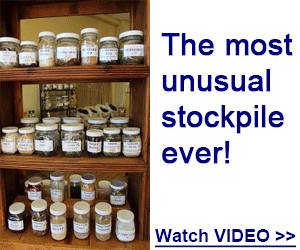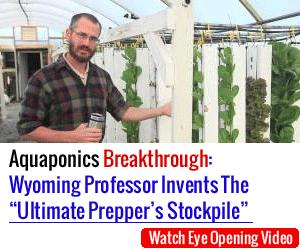Everything You Always Wanted To Know About Growing Your Own Food: But Were Afraid To Ask
The current food system in the US makes everyone want to grow their own food!
There are other motivating factors to growing your own food. Maybe you want to garden because want to pass this lost art down to your kids. Perhaps you want grow your own food because your garden would be a guaranteed source of food for you and your family. Possibly you just want food full of nutrients and free of chemicals. There are a ton of reasons why you should grow your own food.
And everyone says how easy and enjoyable gardening can be.
But a few nagging questions have been holding you back: Don’t I need a lot of land? Can I grow rhubarb and oranges in my area or will neither grow? Why is soil important? Do plants need more than sun and water to grow? How can I grow organically when my plants have bugs? Why are there 100 varieties of tomatoes in seed catalogs and only 3 at the grocery store? and How am I going to know when the plants need something; they can’t talk?
Gardening is one of the hardest “easy” things to do!
Let me explain. I will be the first to tell you I am not an expert. Few people are truly Master Gardeners no matter what their resume says. Granted some of us are better than others but gardening has so many variables that the masters can really only offer ideas. No one knows your garden’s soil, sun exposure, mixture of plants, irrigation, and weather patterns better than you.
Gardening is easy! There really is nothing difficult about putting seeds into soil. But it is huge; you are managing living things which are predictable but vulnerable, kind of like kids but for a much shorter period of time and on a bigger scale. Another difference is instead of one or two kids you have twenty, or fifty, or more plants, if you are lucky. It is a lot to keep up with since each one can have its own set of issues.
A lot of experience, research, intuition, knowledge and love are required to be a good gardener and grow your own food! But just like being a parent, if you take it one day at a time it is manageable, fun and rewarding.
There are tons of blog posts on the internet and articles in magazines that will tell you how to grow bigger, better tomatoes (In case you have not guessed, more gardeners grow tomatoes more than any other plant. Gardeners take tomatoes very seriously!), or how to start square foot gardening, or how to build a raised bed.
If you have never planted a seed in your life, most people will tell you to start by planting a seed and watching it grow. Yes, that is a great idea and I do recommend you do that, right now, today just to get your hands in the dirt, but it is like telling someone who wants to write a novel to start by writing the alphabet. You want more than five tomatoes this season right?
So let me address some of those nagging questions that keep you from having the kind of garden where you can grow your own food. This season you can grow 20% of your fresh vegetables and 80% of your herbs, maybe more. Maybe you will even have enough to put-up. It is completely obtainable and doable! Let me knock out those nagging questions one at a time and give you a little knowledge, hopefully a little confidence and with a little luck help you develop your intuition.
Don’t I Need A Lot of Land?
The short answer is NO!
You just need a place to keep some dirt. That can be a container, a raised bed or a small patch of dirt in your yard. As your thumb gets greener you can expand and if you do not have a lot of land then you can encourage your plants to grow vertically.
To eventually grow 50 to 60% of your food you will need more land. If you live in an apartment or townhome and have no land, then yes, you will need more land. But if you live on at least 1/8 of an acre (house included) then maybe not. Of course this depends on the size of your family, your growing seasons, and the laws in your city (some cities or homeowners associations do not allow you to grow vegetables or fruit in the front yard). I highly recommend you read The Backyard Homestead: Produce all the food you need on just a quarter acre.
Can I Grow Rhubarb And Oranges In My Area Or Will Neither Grow?
Not knowing what grows well in your area (find your zone here) can be discouraging, especially when you find this information out after you have already planted seeds or seedlings.
Most people make this mistake because they plant what they like to eat not knowing how the plant will fair in their climate. It is important to plant what you like! However, it is more important to actually have the food grown and ready to eat when you need it. Do not get me wrong, definitely start out with things you like; if you do not like tomatoes but like spaghetti then you can plan to make spaghetti sauce with your tomatoes. Although this might be your ultimate goal it might not be obtainable the first season; gardening books do not tell you that!
Also, something to consider since we’re talking about growing and then putting-up vegetables: not all those tomatoes will be ripe at the same time. For now, though, we are just talking about getting enough tomatoes to throw on a salad. Most seed packets give instructions about zones and planting times.
One of the easiest ways to find out what really does well in your area is to go to the plant nursery and see what seedlings they have for sale; they stock plants that grow well in the area where they are located. Of course talking to gardening friends is a good way to get this information too. For your first gardening season plant only things that you know will do well in your zone. If you do not like to eat any of them, you may choose to give them away, but at least you will have fresh ripe produce in your hands that you need to figure out what to do with and not a bunch of dead plants.
Why Is Soil Important?
The biggest learning curve for most gardeners, especially organic gardeners, is understanding the importance of soil. It is a science. As in, you have to be a scientist to understand all of it.
Luckily, you really do not need to understand all of it to have good soil. Nature does most of the work, and like everything in nature plants want to grow and thrive and are continually seeking equilibrium. In other words, it is hard to mess it up and if something does get out of whack it is usually simple to fix.This is a great book to start learning about soil.
You just need to be able to spot a few things. I highly recommend making your own compost. It is super easy, but do not try it the first year. The first year you should just buy some organic top soil. It will be the most expensive thing you buy for your garden, but for the first year it is worth it because it allows you to focus on your plants.
Do Plants Need More Than Sun And Water To Grow?
Yes, plants actually need food. Most plants get a large amount of their food from the soil. That is why soil is so important! However, your plants might need a boost for blooming and for growing. So a good understanding of what fertilizer does is important. Visit The Dirt Doctor for a ton of resources on organic fertilizer.
Once you understand fertilizer you will have a better understanding of composting, so it makes sense to plan to start composting after you have read a few books on soil and fertilizer. I recommend using an additional fertilizer the first year you grow your own food, because you do not know the history of your soil. Good soil takes years to develop so while you are building up your soil with good gardening practices you will need to give your plants a little help in the first few years.
How Can I Grow Organically When My Plants Have Bugs?
There are natural pesticides but sometimes they are not so good for the plants or you either. This issue is what I consider a black hole of gardening. I will not eat something that has pesticide on it. Ok, let me rephrase that – I will not eat something I have put pesticide on (I do not always buy organic, and yes, I have a bad case of denial, and yes I know, USA certified organic does not mean pesticide free). I have not found a comprehensive book, website, program or other such packaged advice on how to deal with pests. Of course, figuring out what type of pest you have and then treating for that pest is the key, but I have not found a good bug resource.
That being said there are still some things you can do! The best way to treat for pests is do it naturally with other beneficial insects that eat the pests you have. One school of thought is that your plants will be disease and pest resistant because the soil is so healthy. While this may be true for diseases, I have never found it to be true for bugs. The bugs eat my plants no matter how healthy or unhealthy they are. I do live on a small lot so it is impossible for me to teat neighbors’ yards and this might be a contributing factor.
The next best way to protect your plants from pests is to go out and pick them off yourself. This is time consuming and sometimes downright gross but it really is beneficial for you and the plant, as you get a firsthand knowledge of the bug’s behavior: numbers, hiding places, plants affected, etc. If those things do not work you might try food grade Diatomaceous Earth sprinkled at the base of the plant. It might not help with flying insects but it will do a great job on other pests like grasshoppers. There are ton of recipes for natural pest control, however, I have found the only tried and true method is experimenting.
There is no right or wrong! There is no method that works every time, all the time! Over time you can acquire some knowledge and put it in your gardening “bag of tricks” but there are no guarantees! Pests are the enemy!
Why Are There 100 Varieties Of Tomatoes In Seed Catalogs And Only 3 At The Grocery Store?
This is one of the reasons you are growing your own food. You can grow many more varieties than what is in the grocery store. Your food will taste better and have more nutrients than the food in the store. Pick varieties that will grow well in your zone and look forward to the diversity. If you are not interested in saving seeds (and you don’t need to be for your first gardening year), you might want to start with a hybrid variety. I go into detail about hybrid, heirloom, and GMO seeds here.
How Am I Going To Know When The Plants Need Something; They Can’t Talk?
Well, the funny thing is that plants do tell you what they need, they just do not use spoken language.
If you can tell the difference between a living plant and a dead plant you have the general idea. A healthy plant has a different color, texture, girth, and aroma than a dead plant.
So these are the things to keep an eye on. If you see a change in any of them you need to figure out why the change has occurred. I am oversimplifying it a bit, after all they are living growing things and some changes are natural and expected, but keeping a close eye on the things I mentioned and noticing why they are happening will do great things for your gardening education.
As you watch your plants grow from seedlings to adults you will understand their life cycle, so when thing start going wrong you will notice sooner. It is like when your first child starts sneezing and you are not sure if they have a cold, by the time the third child comes along you are able to make a faster diagnosis because you have seen the symptoms before. This is the same thought process with plants only the seasons are shorter and so you gain this experience a lot faster.
Other useful resources:
Survive Attack to Our Power Grid System (Weap on That Can Instantly End Modern Life in America)
on That Can Instantly End Modern Life in America)
Survival MD (Best Post Collapse First Aid Survival Guide Ever)
Backyard Innovator (A Self Sustaining Source Of Fresh Meat,Vegetables And Clean Drinking Water)
Blackout USA (EMP survival and preparedness)
Conquering the coming collapse (Financial advice and preparedness )
Liberty Generator (Build and make your own energy source)
Backyard Liberty (Easy and cheap DIY Aquaponic system to grow your organic and living food bank)
Bullet Proof Home (A Prepper’s Guide in Safeguarding a Home )
Family Self Defense (Best Self Defense Strategies For You And Your Family)
Survive Any Crisis (Best Items To Hoard For A Long Term Crisis)
Survive The End Days (Biggest Cover Up Of Our President)
Drought USA(Discover The Amazing Device That Turns Air Into Water)
SOURCE : arewecrazyorwhat.net
 I’m striving to live a more self-reliant lifestyle in a very dependent world. Please join me, whether it’s a small DIY project or a lifestyle change we can all learn from one another!
I’m striving to live a more self-reliant lifestyle in a very dependent world. Please join me, whether it’s a small DIY project or a lifestyle change we can all learn from one another!

